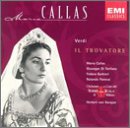| All Artists: Verdi, Callas, Di Stefano, Barbieri Title: Il Trovatore (Highlights) Members Wishing: 0 Total Copies: 0 Label: Angel Records Release Date: 6/2/1998 Genre: Classical Styles: Opera & Classical Vocal, Historical Periods, Modern, 20th, & 21st Century Number of Discs: 1 SwapaCD Credits: 1 UPC: 724356666924 |
Search - Verdi, Callas, Di Stefano :: Il Trovatore (Highlights)
 | Verdi, Callas, Di Stefano Il Trovatore (Highlights) Genre: Classical
|
Larger Image |
CD Details |
CD ReviewsA SUPERB LEONORA BUT A DISORIENTED MANRICO AND RELAXED TEMPI jfmaniaci | Broadbeach, Queensland, Australia | 07/11/2001 (3 out of 5 stars) "Trovatore is among my favorite operas, which I get to listen with passionate expectations. This opera is a masterpiece of dramatic situations. To achieve a supreme effect, there is need of four voices of absolute strength; capable of bel canto, soft tones; dramatic accents and brilliant top notes, supported by a score conducted at an urgent pace. Alas! This Trovatore performed by Di Stefano/Callas/Barbieri/Panerai/VON KARAJAN failed to rise to the occasion. The reasons are the wrong choice of Di Stefano and Panerai to interpret their roles vocally and dramatically, except for the divina Callas and partly imposing Barbieri. Add to these Von Karajan's mixed reading of the score, relaxed tempi and tame climactic moments, proving his poor affinity with the operas of Verdi.With a warm and Mediterranean musical instinct, Di Stefano was Callas' great partner at La Scala. His fame rivaled those of Del Monaco and Corelli in all major theatre and concert halls of the world. He had begun singing in the late forties with naturalness, simplicity, good taste and discipline as shown in The Pearl Fishers. Sadly, within 10 short years, he changed technique for the worse in Tosca and Gioconda. He abused his voice with widely opened notes, neglecting the dimensions of voice and emission. The penalty was very harsh when the voice disappeared prematurely. A listener elsewhere referred to his voice deterioration as "frightening" and you may notice it on this CD as Di Stefano sang Manrico in 1956. Impure bel canto in the troubadour song, poor mezza voce in "Non son tuo figlio", shouts in the famous "Pira", short breath and no squillo in "All'armi". The famous fiery aria was no showpiece at the end of Act III and broke the performance success in half. Panerai was a baritone specialising in Mozart and Rossini with an intelligent use of attentive, discreet and varied modulations. Later, he took on more engaging roles as the Count in Trovatore or Sir Richard in Puritani. On the CD under review, he did not possess the dramatic accent and exasperated jealousy of the Count. Therefore, he was not a cautious choice to sing the Count. I recently reviewed a fresh release in early 2001 of Trovatore with four great singers Lauri Volpi/Mancini/Pirazzini/Tagliabue/PREVITALI. Vocally and artistically, it is a stupendous and passionate studio recording made in Rome, February 1951. Buy it, because you will not find a better Trovatore in circulation at present."
|

 Track Listings (12) - Disc #1
Track Listings (12) - Disc #1